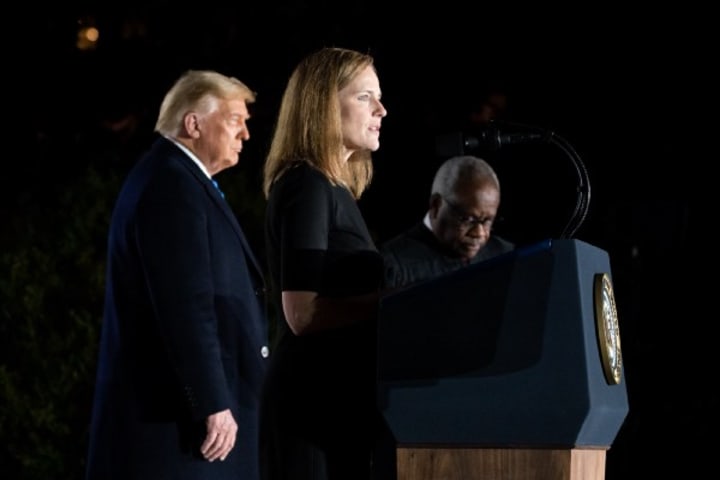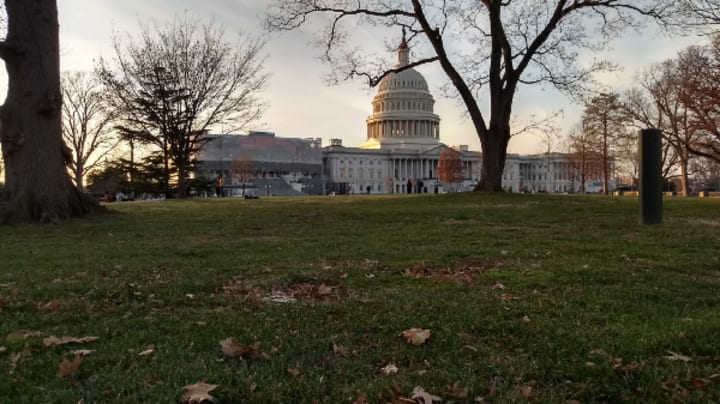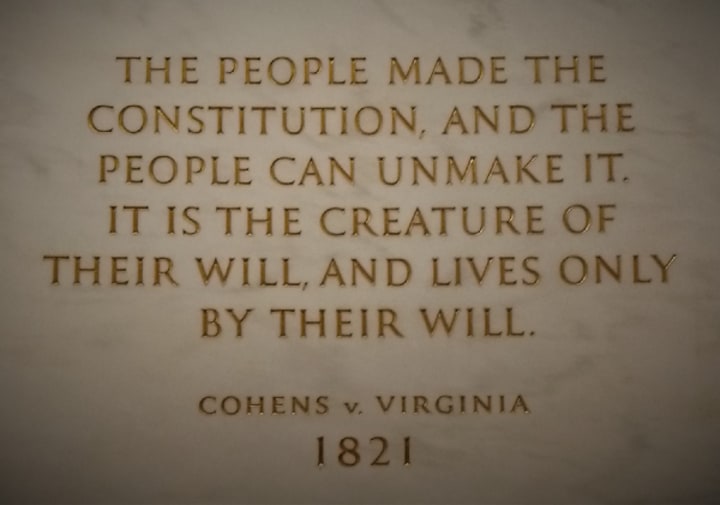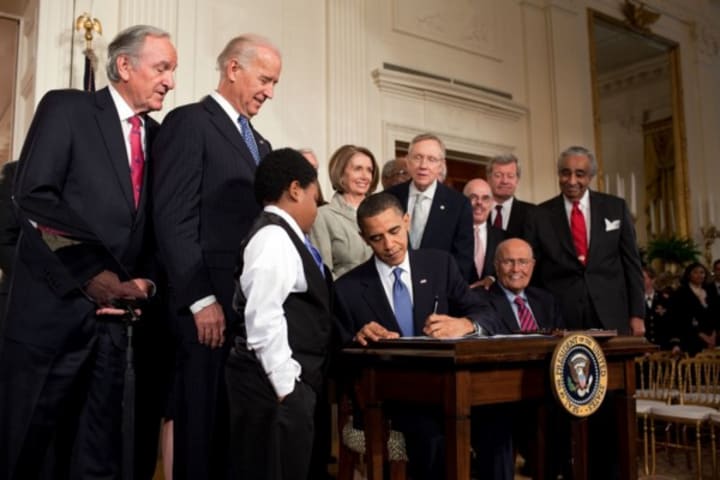Ending the Tyranny of Mitch McConnell
Or Nancy Pelosi, or Kevin McCarthy, or Chuck Schumer

» KEY POINTS
- Certain members of Congress over time have given themselves an un-Constitutional unchecked power to control the entire legislative process.
- All of that power has eroded cooperation, debate, collaboration, compromise, civil discourse, and the general functionality of the federal government.
- The only way to remove that power is to amend the Constitution, enforce a legislative methodology, and severely punish those who try to circumvent the rules for personal or Party gain.

I don’t think either Party if it controlled, if it were different from the President, would confirm a Supreme Court nominee in the middle of an election. What was different in 2020 was we were of the same Party as the president.
Senator Mitch McConnell (R-KY) on the Hugh Hewitt Show on June 14, 2021 discussing what he would do if there were a Supreme Court vacancy in 2024—and potentially 2023—and the Republican Party held a majority in the Senate.
When Supreme Court Justice Anthony Scalia died in 2016, President Barack Obama did his Constitutional duty by presenting a nominee to the Senate in Merrick Garland. The Senate’s job was simple: interview and vet the candidate then cast a yay or nay vote. That is all there is to it! Instead, Senate Majority Leader Mitch McConnell decided to block the candidate from even getting a chance to talk to Congress, never mind voting for or against him. Then, after President Donald Trump took office, he in turn nominated Neil Gorsuch and McConnell immediately took up the nomination. When it became apparent he was not going to have the minimal votes required to instate Gorsuch, McConnell then changed the rules to push the nominee through with a simple majority.
Finally, in May 2019 McConnell told various groups he would completely ignore his own reasoning for not bringing Obama’s nominee to the floor (Supreme Court nominees should not be considered in a Presidential election year) if a Supreme Court position became available in an election year of President Trump. This, of course, came to pass with the death of Justice Ruth Bader Ginsburg on September 18, 2020. At that point, not only was it truly within the election “season”, but millions of absentee ballots had already been cast. Justice Amy Coney Barrett was confirmed just 8 days before the official election day—an election in which Republicans indisputably lost both the White House and the Senate.

Those actions were done with the malicious intent of personal Party gain and had nothing to do with just fulfilling the roles and responsibilities as laid out by the Constitution. And based upon the quote above and the rest of the interview, McConnell is already prepared to do the exact same and even more in the future. Not taking up legislation within a required timeframe, ignoring the Executive Branch’s ability to bring an item to the Senate Floor, pushing bills through below an acceptable threshold, and capriciously changing rules in order to create a loophole around the intent of the Constitution—these are all in the McConnell playbook.
While these acts may be unscrupulous, unethical, contemptible, anti-democratic, and anti-American, they are not against the Constitution!
Reading the Constitution as written, McConnell has done no wrong. He has worked within the framework of the law and manipulated it to his favor. Those like McConnell—whether Republican, Democrat, or otherwise—would also be within their rights to do exactly the same thing or something similar. Many have promised to do so, and others already have done so in the past. For example, in 2014 the Senate was controlled by Democrats while the House of Representatives was in the hands of Republicans. By July 2014, the latter were complaining loudly to the press about the over 300 bills the House had passed but the Senate had not taken up under the tutelage of Majority Leader Harry Reid (D-NV), building a “legislative graveyard” of his own.
And they were exactly right! Sure, those bills stood almost no chance to pass the Senate and—even if they did—would surely have been vetoed by President Obama. But that is not the job of the leaders of these chambers; the job of Congresspeople is only to fashion and vote on bills, not to use legislative tools to avoid doing what they are Constitutionally obligated to do. Most certainly, their job is not to create never ending gridlock.

Actions like these are not in the interests of the people of the United States; they are designed to benefit a single Party’s power. Now, a Party may be doing what it thinks is best for all people, but unfortunately Congress is not a representation of the will of the people. We have discussed that in the previous two chapters, so for now let us focus on how to make the legislature we have function with a modicum of normalcy and efficiency.
» SQUARE PEGS AND ROUND HOLES
There is no doubt that Congress has become broken from the simple fact that so little legislation gets through; there is more time spent on using the made-up rules of Congress as weapons and technicalities than on organization and process; and that the items that do pass often are going through only on Party lines or a thin margin with the other Party involved. With few to no individually minded Congresspeople thinking of their constituents instead of their own Party politics, we are in an era of stall and go-go-go that ebbs only as one Party receives a small level of control of both chambers of Congress and the Presidency.
This is no way to govern.
The Constitution of the United States does not lay out any specific processes about how the House of Representatives and the Senate should work. Instead, it explicitly leaves those decisions up to the individual chambers. All of the rules, procedures, and methods of passing a law are all made up and could be thrown away at any time. Yet, all those measures not only continue to exist, they have become endemic tools and weapons to be used for political purposes instead of the function as laid out by the Constitution: to pass laws.
The only thing stopping Congress from fixing inequities in how it is set up is Congress itself.
While some may want to nitpick over slight adjustments within the existing framework, it is truly past time to consider the indifference of the Constitution to be a detriment. Further ways of skirting the letter of the law continue to be implemented despite the chilling effects on democracy. To end the tyranny of one person or a few select people having such vast controls, Congress needs Constitutionally enforced Amendments to act in benefit of the nation and not in benefit of individual members or their Parties.
» AMENDING A DAY IN CONGRESS
We the people have a problem where a handful of individuals—and often just two—have a monopoly control over the country that was never granted to them and power over other legislators that are supposed to be their equals. It does not matter if a Representative is 25 years old and just elected or has been serving for 50 years, they are 100% equal in the eyes of the Constitution. As such, we need to add some Amendments in order to rip back what never should have taken root in the first place and make sure Congress can function nominally:
The Speaker of the House of Representatives and the President or President Pro Tempore of the Senate shall be responsible for scheduling all debate and voting of their respective chambers.
While the positions of Speaker of the House and President/President Pro Tempore of the Senate are laid out in the Constitution, there is nothing that states what those responsibilities include. This Clause is focused on giving them a very specific responsibility: setting the agenda and calendar for debate and voting. Notice as well, that it is the President of the Senate (the Vice President of the United States) or the President Pro Tempore that are setting the agenda in the upper chamber and not the “Majority Leader”. Being that the Majority Leader is not a recognized position, we should work within the framework of the Constitution to grant responsibility to an existing position.
Any legislation proposed by individual members of each chamber should be considered for schedule and voting by the leaders of the respective chambers. The leader of the chamber may refuse to add the legislation to the schedule, however if the legislation is sponsored by ten percent or more of the chamber it must be added to the schedule within thirty days of presenting the required sponsorship to the leader of the chamber.

Basically, this is a codification of how an item is going to come up for vote. The leader of each chamber should act as a gatekeeper because someone needs to be operations manager. But at the end of the day, they are subordinate to the will of all other legislators. The first part of this Clause makes it so anyone can present an item to the leader and the leader can just add it to the agenda with no questions asked. However, given there is a possibility for extreme fringe views to make it into a chamber, the leaders would have a filter mechanism to control what could ultimately just be a waste of time. This, in turn, could be overwritten with a small minority, making sure that power is kept in check.
The Vice President of the United States—as President of the Senate—may propose legislation that must be added to the schedule and voted on within thirty days.
While it is an odd bit of the Constitution that the Vice President of the United States is the President of the Senate, there is a reason for this. Recall that with our three-part government that we always want to make sure one branch will not have complete power over the others and that each is constantly kept in check by the other two. This power of the Vice President is a check by the Executive Branch on the Legislative Branch by making sure the legislature takes into consideration the concerns of the Executives. Much like minority representation in the prior Clause, this one gives executive representation in the law-making process.
Something similar will have to be done with the Judicial Branch, but we will discuss that in the next chapter. For the moment, the focus must be on what happens to legislation within Congress, no matter its genesis.
Any legislation that shall pass through either chamber of Congress must be scheduled and voted on by the other chamber within ten days.
Now we move into the process whereby neither the leaders nor the majority Party of an individual chamber of Congress could stop legislation from moving through the next step. While earlier we established the responsibility of setting the schedules, here we taper that power further by making it clear that there is a responsibility to call a vote on something that has passed. In this way, this clause will remove the un-Constitutional power that the Speaker of the House and the Majority Leader of the Senate have bestowed upon themselves and level the playing field between each chamber. No matter what, then, a piece of legislation must be heard in the other chamber and voted upon.
All legislation must consist of single clauses directly related to the same subject at hand. Each clause and amendment must be passed separately in its own approval process.
Just as this subchapter has been written in individual clauses, so, too, must Congress write their bills. Then, it is not voting on a bill in totality if there is just one part that is objectionable. Instead, each component would be open for debate, voting, and sending to the President for signature or veto. As written, this would also give the President line-item veto power since each clause would be presented individually and therefore would require specific sign-off on each one.

At the same time, if there are differences between the House and the Senate, the differences will come through Amendments that would move through their own process so as not to stop the individual clauses if there are no threshold objections. More important than all of that, though, is the end of pork packages. It is a common practice for Congress to attach some unrelated spending to a bill as a matter of compromise in order to get a particular person’s or group’s vote. More often than not these add-ons have nothing to do with the legislation at hand and everything to do with securing funding for the Representative’s or Senator’s home area and scoring brownie points with the voters.
All Representatives and Senators, save for vacancies or physical inability, are required to cast a vote on all legislation presented before that chamber of Congress.

This may seem an odd item, but theoretically a Representative or Senator could just walk out of the room (or never show up to the room in the first place) and not vote on an item. Abstaining (voting “present”) is a tool commonly used to avoid the appearance of taking a stand or getting on the record of exactly where a person or organization aligns. Our elected officials must be held accountable, and the only way to do that is to have them on the record. This is how the voters get to check on those representing them because there is a definitive record of not just where they stand on a bill in total, but on each clause and adjustment of that act. The official record can be used for or against an individual that is supposed to be the will of their electorate.
All legislation must have at minimum sixty-one percent of the vote of all legislators in the chamber in order to pass to the next phase of the bill’s process.
Here is the biggest rub of all. Today, certain legislation can pass from one chamber to the next and up to the President with a simple majority. As the last twenty years have shown, this means the bulk of legislation was passed on Party lines. When one Party had control of all chambers of Congress and the Presidency, they were able to get their special interest items through. This includes recent massive items like the Affordable Care Act of 2010 and Tax Cuts and Jobs Act of 2017.
Poignantly, Congress used to believe they should reach a higher level of acceptance. This was especially true in appointments to the Supreme Court where Senate Rules required a “super majority” of 60 votes (also known as the “filibuster”). As discussed in the introduction, though, with stonewalling and no discussions between Parties, this requirement was removed in favor of a simple majority. Other concerns may yet remove this legislative hurdle with the shoe on the other foot.
We need to take that choice out of their hands and make sure legislation that has passed already has at least a “super majority” so that it is not just a constant batter-up position. Engraving in the Constitution a 61% requirement for any bill to pass will be closer to getting real legislation into law and limit individual party power. Couple this with the previous discussions on limiting Party power and the total impacts will be future-proofed.
Congress shall make no rules or exceptions to circumvent the process of scheduling and conducting a vote.
This one sentence expresses the thought: do not try to create loopholes! The bureaucracy in Congress is self-inflicted, but that does not mean that all of it is without value. These rules were created to bring order to what can be a chaotic process within a large body of people. The problem has been that over time these rules have mutated from helpful elements to weapons of war that prevent Congress from functioning in order to push (or suppress) a specific agenda. Here we have a Clause that is ambiguous as well as wide, making all of those rules reviewable under a single criterion: does it stop legislation from flowing naturally? If a rule does not, then there is no worry. If it does, then there must be consequences.
Failure to follow the guidelines of the Constitution and any future amendments for the conduct of Congress shall be considered Treason of the United States of America. The Vice President of the United States is responsible for enforcement of this clause and bringing forth charges of Treason against individual members of Congress.
The point of this last Clause is to remove the shield of invincibility that members of the government have. If they do not follow the rules or abuse their positions, what is the consequence? Most of the time it is nothing at all, and at worst it is loss of their job when the voters get a chance. There needs to be a real and tangible consequence for trying to abuse the trusted position of a Representative or Senator.
Therefore, the recommendation is to make it treason to try to stop legislation using rules and procedures and underhanded tactics. There are succinct responsibilities and functions that the leaders of each chamber and the members within have, and if they refuse to do their duty then they need to be punished. For the sake of democracy, the unabashed impudence must end.

The above piece is an excerpt from Always Divided, Never United: And Other Stories During a Time of Pandemics and Politics by J.P. Prag, available at booksellers worldwide.

Learn more about author J.P. Prag at www.jpprag.com.

An earlier version of this article appeared on Medium.
About the Creator
J.P. Prag
J.P. Prag is the author of "Aestas ¤ The Yellow Balloon", "Compendium of Humanity's End", "254 Days to Impeachment", "Always Divided, Never United", "New & Improved: The United States of America", and more! Learn more at www.jpprag.com.
Enjoyed the story? Support the Creator.
Subscribe for free to receive all their stories in your feed. You could also pledge your support or give them a one-off tip, letting them know you appreciate their work.






Comments
There are no comments for this story
Be the first to respond and start the conversation.